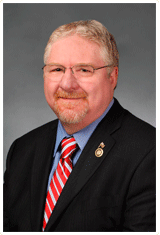This week, the Senate approved legislation that makes critical changes to the state’s initiative and referendum petition process, a once admirable program created to empower voters that has fallen victim to rampant abuse and fraud in recent years.
As chairman of the Financial and Governmental Organizations and Elections Committee, I’ve heard numerous stories of abuse within the initiative petition process, particularly when it comes to gathering signatures to have the proposal placed on the ballot, from falsifying signatures to misleading people about what exactly they’re agreeing to support.
It’s an issue we’ve tried to address in recent years, but finding a consensus has been difficult. This year, my colleagues and I worked with both sides to craft a compromise that would fix some of the more egregious problems. Senate Bill 2 creates a number of protections to prevent fraud and abuse. It also clarifies the role of the Secretary of State in the process.
Under the bill, petition circulators must affirm that they’ve never been found guilty of an offense involving forgery, are at least 18 years old, whether they are being paid to circulate the petitions and if they are, who is paying them. It also strengthens the laws for falsifying signatures and requires the Secretary of State to post the full text of the petition within two days of receiving such a petition, among other provisions.
On Thursday, the Senate approved Senate Bill 2, sending it to the House for consideration. The bill in no way solves all of the problems within the initiative petition process, but it is an important step in the right direction. I’d like to thank Rep. Tony Dugger, who worked extensively on this issue.
The Missouri Senate also gave final approval to Senate Bill 83, which includes a provision identical to legislation I filed this year to deal with an issue currently affecting citizens in our area. Neighborhood Improvement Districts (NID) are created by communities that wish to improve public facilities like sidewalks, parks or streetlights. These are paid for by special tax assessments to property owners in the area. However, these projects can take a while to complete, and in that time, a resident may sell their home.
When the new owner purchases it, they may not be aware that a NID tax assessment has been placed against the house. In some instances, failure to pay these assessments has resulted in a lien against the property. Resolving the issue is a long and arduous process, with the burden on the new owner, who was completely unaware of the situation until it was too late.
The provision in Senate Bill 83 I sponsored requires the notice of neighborhood improvement districts to be filed with the recorder of deeds. This step will make the information more readily available to prospective home buyers so they can know exactly what they’re getting into. The bill received final approval on Thursday. It now goes to the House for consideration.
If you have any questions or comments about this or any other matter regarding your state government, please feel free to contact me at (573) 751-1503; you are also welcome to e-mail me at jay.wasson@senate.mo.gov. |



